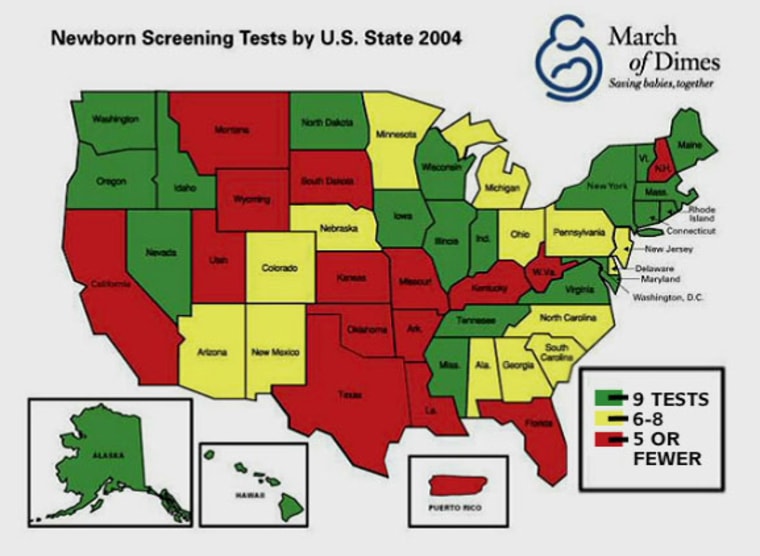Though parents may not realize it, every newborn baby is automatically tested for a variety of potentially fatal genetic diseases — many of which are easily treatable if caught early enough. But surprisingly, when it comes to genetic screening, not all babies are treated equally. Depending on which state you live in, the number of diseases for which tests are conducted varies widely. And even though additional testing is relatively inexpensive and easily available, many parents are totally in the dark about their options.
In a special four-part series titled, “Testing Your Baby,” “Today” looks at the politics, ethics and medical technology involved in newborn testing as well as what parents need to know, and we’d like to hear your questions. Do you have a question about newborn testing? If so, fill out the form below and on Friday, July 2, Jennifer Howse, president of the March of Dimes, will try to answer as many questions as possible, live on “Today.”

WHAT TESTS SHOULD PARENTS KNOW ABOUT?
The March of Dimes recommends testing for these diseases:
Medium-Chain Acyl-Coa Dehydrogenase (MCAD) Deficiency
Incidence: 1 baby in 15,000 An inherited disorder of fatty-acid metabolism caused by the lack of an enzyme required to convert fat to energy. Seemingly well infants or children can suddenly develop seizures, respiratory failure, cardiac arrest, coma, and death. Identifying affected children before they become ill is vital to preventing a crisis and averting these consequences. Treatment includes steady food or glucose intake and avoidance of fasting.Phenylketonuria (PKU) Incidence: 1 baby in 12,000 An inability to properly process the essential amino acid phenylalanine, which then accumulates and damages the brain. PKU can result in severe mental retardation unless detected soon after birth and treated with a special formula. Affected individuals must be kept on a low phenylalanine diet at least throughout childhood, adolescence, and for females, during pregnancy.
Congenital Hypothyroidism Incidence: 1 baby in 4,000 A thyroid hormone deficiency that severely retards both growth and brain development. If detected soon after birth, the condition can be treated with oral doses of thyroid hormone to permit normal development.
Congenital Adrenal Hyperplasia (CAH) Incidence: 1 baby in 5,000 CAH refers to a set of inherited disorders resulting from defects in the synthesis of hormones produced by the adrenal gland. Certain severe forms of CAH cause life-threatening salt loss from the body if undetected and untreated. Treatment includes salt replacement and hormone replacement.
Biotinidase Deficiency Incidence: 1 baby in 70,000 Biotinidase is the enzyme that recycles biotin, a crucial B vitamin. Biotinidase deficiency may cause serious complications, including frequent infections, uncoordinated movement, hearing loss, seizures, and mental retardation. Undiagnosed and untreated, the deficiency can lead to coma and death. If the condition is detected soon after birth, these problems can be prevented simply by giving the baby extra biotin.
Maple Syrup Urine Disease Incidence: 1 baby in 250,000 A rare inborn error of metabolism that is lethal if unrecognized and untreated. There is a wide spectrum of this condition from mild to severe. Affected babies appear normal at birth but soon begin to have neurological symptoms. It is unusual for severely affected babies to survive the first month, and those who do usually have irreversible mental retardation. Rapid diagnosis and treatment are major factors in survival and mental development. Therapy consists of a special diet that requires frequent monitoring and must be continued indefinitely.
Galactosemia Incidence: 1 baby in 50,000 Affected babies are missing the liver enzyme needed to convert galactose, a major sugar found in milk, into glucose, another simple sugar that the body can use. Galactose then accumulates in and damages the vital organs, leading to blindness, severe mental retardation, infection, and death. Milk and other dairy products must be eliminated from the baby's diet.
Homocystinuria Incidence: 1 baby in 275,000 A rare deficiency in the enzyme responsible for converting the amino acid homocysteine into cystathionine, which is needed by the brain for normal development. If undetected and untreated, homocystinuria leads to mental retardation, eye problems, skeletal abnormalities, and stroke. Treatment consists of a special diet, which for many patients includes high doses of vitamin B6 or B12, although treatment is not completely effective.
Sickle Cell Anemia Incidence: 1 baby in 500 among African-Americans; 1 baby in 1,000 to 30,000 among Hispanics (depending on the region of the United States); less common among babies with other ethnic backgroundsA blood disease that can cause severe pain, damage to the vital organs, stroke, and sometimes death in childhood. Young children with sickle cell anemia are especially prone to dangerous bacterial infections such as pneumonia and meningitis. Vigilant medical care and treatment with penicillin, beginning in infancy, can dramatically reduce the risk of these adverse effects and the deaths that result from them.
Hearing Impairment Incidence: 1 to 3 babies per 1,000 in well-baby nursery; 2 to 4 per 100 in neonatal intensive care Significant hearing impairment is one of the most common developmental abnormalities present at birth. Undetected, the condition will impede speech, language, and cognitive development. The March of Dimes supports newborn hearing screening for every baby in every state because of the potential benefits, but is concerned about the current level of technology and intervention. Implementation of universal newborn hearing screening should occur only where adequate provisions are made to avoid oversight, ensure quality, and provide the necessary followup. Even so, parents need to be alert throughout childhood for hearing impairment.